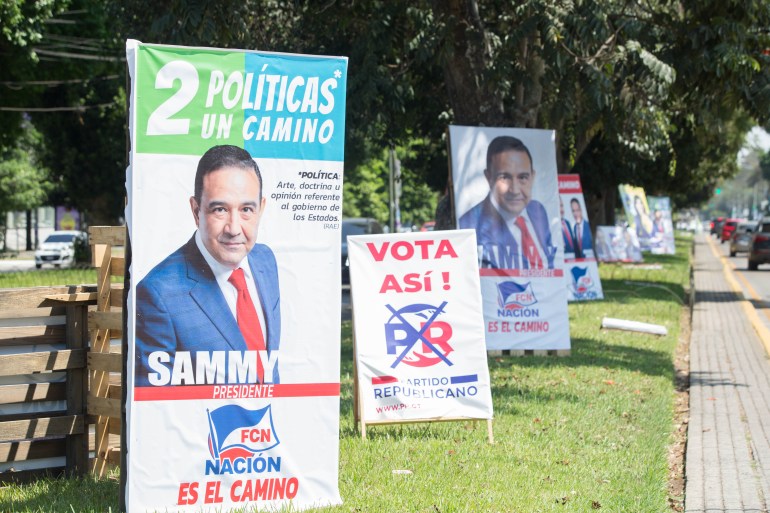Guatemala City — Campaigning began in earnest last month for Guatemala’s general elections, with political messaging filling the streets, local broadcasts and social media.
But less than three months before the June 25 vote, concerns are mounting among national and international observers over the integrity of the process.
“There is a lot of distrust in the environment around the election,” Gabriela Carrera, a political science professor at Rafael Landivar University in Guatemala City, told Al Jazeera. “This is the result of the incapacity of the Supreme Electoral Tribunal … combined with a series of arbitrary decisions that the magistrates have been taking.”
At least 30 political parties are set to contest the upcoming elections, with more than 22,000 candidates registered to run for the presidency, congress, regional parliament and councils across the country. But Guatemala’s Supreme Electoral Tribunal, which governs elections, has blocked several opposition candidates from running on “dubious grounds”, according to Human Rights Watch. Observers say this raises a red flag.

“The arbitrary blocking of candidates because they represent a danger to the [political] establishment is serious,” Ana Maria Mendez Dardon, the Central America director for the Washington Office on Latin America, told Al Jazeera. “It has also brought little credibility to the institutions that have to ensure the integrity of the [electoral] process.”
A spokesperson for the Supreme Electoral Tribunal told Al Jazeera that the body was following constitutional norms, noting that the cases in question are complex.
The blocked candidates include leftist Indigenous leader Thelma Cabrera, who earned fourth place in the 2019 presidential election, and Roberto Arzu of the right-wing Podemos party. Cabrera was blocked over an alleged issue related to a payment received by her running mate while he was ombudsperson, while Arzu was barred for allegedly campaigning ahead of the legal period.
Cabrera and her supporters have protested her exclusion since February. Meanwhile, a Guatemalan prosecutor is seeking to lift the immunity of another presidential candidate, Edmond Mulet, after he called for an investigation into a judge who ordered a probe of nine journalists from El Periodico newspaper. Candidates usually have immunity from prosecution during an election campaign.
Corruption allegations
While the Supreme Electoral Tribunal ruled against several popular candidates, it has permitted many others with alleged ties to corruption to run for office.
Zury Rios, the daughter of former dictator General Efrain Rios Montt and a candidate with the right-wing Valor party, is among the presidential frontrunners, according to a February CID Gallup poll. Rios, who previously served in congress from the mid-1990s to 2012, was temporarily blocked from running in 2019 because of a constitutional ban on family members of coup leaders holding the presidency. There have been a number of conflicting rulings over the years on whether such bans should be enforced.
Her candidacy is largely supported by the Guatemalan economic and military elite, but her participation has raised concerns for the families of victims affected by state-led violence during her father’s dictatorship. Last month, activists and victims of Guatemala’s 36-year civil war, in which more than 200,000 people were killed or forcibly disappeared, marched against her candidacy and called for more transparency in elections.
Other candidates running for legislative or mayoral positions stand accused of bribery, drug offences or other criminal charges, including some who have been sanctioned by the United States.
“The Supreme Electoral Tribunal has accepted these candidates as a message of deep rejection of these types of sanctions,” Mendez Dardon said. “It is saying, ‘I don’t care now.’”
These are the first general elections to be held since the closure of the United Nations-backed International Commission Against Impunity in Guatemala, which shut its doors following the 2019 vote, after the government opted not to renew its mandate.

Since then, judges, prosecutors and investigators associated with corruption or transitional justice cases related to Guatemala’s civil war have been targeted by authorities and far-right groups, with some being forced into exile in recent years.
The rollback of democratic institutions since the expulsion of the commission has culminated in the upcoming elections, which analysts say are the most worrying since the country’s return to democracy in 1985 after years of military dictatorship.
“We are seeing the first restricted elections since 1985,” Edie Cux, a lawyer and election observer with the independent watchdog group Mirador Electoral, told Al Jazeera.
“There is a manipulation of the system, from registration, to the [practice of] purchasing votes, to the manipulation of the electoral and the justice system. These elections qualify as restricted and a step towards autocratic rule.”
